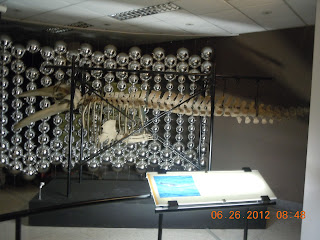Squirrel Monkey Bones, Cricket Fighting, and Lectures
Yesterday was another long day, and I am hoping that I can
get over this jet lag and get used to the humidity so I do not feel exhausted
all of the time. We went to two museums yesterday. The first one was NTU’s Museum of Zoology
Baleen Whale
After the Museum
of Zoology
Cabinets inside collection room
Dragon Fly that flew into Insectarium before we arrived!
After the museum tours we had 3 lectures and our 2nd
Chinese class. The first lecture was on the geography of Taiwan Taiwan Taiwan Taiwan Taiwan has
the highest species diversity of lobsters in the world; most corals are
hermaphrodites; some jellyfish can photosynthesize because they contain algae
in their tissues; one of the reasons Taiwan



No comments:
Post a Comment